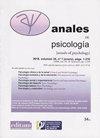Robustness of Generalized Linear Mixed Models for Split-Plot Designs with Binary Data
IF 1.4
4区 心理学
Q3 PSYCHOLOGY
引用次数: 0
Abstract
This paper examined the robustness of the generalized linear mixed model (GLMM). The GLMM estimates fixed and random effects, and it is especially useful when the dependent variable is binary. It is also useful when the dependent variable involves repeated measures, since it can model correlation. The present study used Monte Carlo simulation to analyze the empirical Type I error rates of GLMMs in split-plot designs. The variables manipulated were sample size, group size, number of repeated measures, and correlation between repeated measures. Extreme conditions were also considered, including small samples, unbalanced groups, and different correlation in each group (pairing between group size and correlation between repeated measures). For balanced groups, the results showed that the group effect was robust under all conditions, while for unbalanced groups the effect tended to be conservative with positive pairing and liberal with negative pairing. Regarding time and interaction effects, the results showed, for both balanced and unbalanced groups, that: (a) The test was robust with low correlation (.2), but conservative for medium values of correlation (.4 and .6), and (b) the test tended to be conservative for positive and negative pairing, especially the latter. Este artículo examina la robustez del modelo lineal mixto generalizado (GLMM, por sus siglas en inglés). El GLMM estima efectos fijos y efectos aleatorios y es especialmente útil cuando la variable dependiente es binaria. También es útil cuando la variable dependiente es de medidas repetidas, ya que puede modelar la correlación. El presente estudio utilizó la simulación de Monte Carlo a fin de analizar las tasas de error de Tipo I empíricas de los GLMM en diseños split-plot. Las variables manipuladas fueron el tamaño de muestra, el tamaño de grupo, el número de medidas repetidas y la correlación entre las medidas repetidas. También se consideraron condiciones extremas, tales como muestras pequeñas, grupos no balanceados y diferente correlación en cada grupo (emparejamiento entre tamaño de grupo y correlación entre medidas repetidas). Para grupos balanceados, los resultados mostraron que el efecto grupo era robusto en todas las condiciones, mientras que para grupos no balanceados el efecto tendía a ser conservador con emparejamiento positivo y liberal con emparejamiento negativo. Con respecto a los efectos tiempo e interacción, los resultados mostraron, tanto para grupos balanceados como para no balanceados, que: (a) la prueba fue robusta con baja correlación (.2), pero conservadora para valores medios de correlación (.4 y .6), y (b) la prueba tendía a ser conservadora para emparejamiento positivo y negativo, especialmente en este último.二值数据分离式设计广义线性混合模型的鲁棒性
本文研究了广义线性混合模型的鲁棒性。GLMM估计固定和随机效应,当依赖变量是二进制时尤其有用。当相关变量涉及重复测量时,它也很有用,因为它可以建模相关性。本研究使用蒙特卡洛模拟分析了GLMMS在分裂图设计中的经验I型误差率。操纵的变量是样本大小、组大小、重复测量的次数以及重复测量之间的相关性。还考虑了极端条件,包括小样本、不平衡的群体以及每个群体中的不同相关性(群体规模之间的配对和重复措施之间的相关性)。对于平衡群体,结果表明,在所有条件下,群体效应都是强大的,而对于不平衡群体,影响往往是保守的,有积极的回报,而自由的,有消极的回报。关于时间和相互作用的影响,结果表明,对于平衡和不平衡的群体来说:(a)该测试具有低相关性(.2)的鲁棒性,但对于中等相关性(.4和.6)的值是保守的,并且(b)该测试倾向于对正性和负性支付,特别是后者是保守的。本文研究了广义混合线性模型(GLMM)的鲁棒性。GLMM估计固定效应和随机效应,当因变量是二进制时特别有用。当因变量是重复测量时,它也很有用,因为它可以建模相关性。本研究使用蒙特卡洛模拟来分析分裂图设计中GLMM的经验I型误差率。操纵的变量是样本量、组大小、重复测量的次数以及重复测量之间的相关性。还考虑了极端条件,如小样本、不平衡组和每组不同的相关性(组大小之间的匹配和重复测量之间的相关性)。对于平衡组,结果表明,组效应在所有条件下都是稳健的,而对于非平衡组,组效应在正配对时趋于保守,在负配对时趋于自由。关于时间和相互作用的影响,结果表明,对于平衡组和非平衡组来说:(a)该测试在低相关性(.2)下是稳健的,但在平均相关值(.4和.6)下是保守的,(b)该测试在阳性和阴性配对中趋于保守,尤其是在后者中。
本文章由计算机程序翻译,如有差异,请以英文原文为准。
求助全文
约1分钟内获得全文
求助全文
来源期刊

Anales De Psicologia
医学-心理学
CiteScore
3.30
自引率
5.90%
发文量
57
审稿时长
4-8 weeks
期刊介绍:
Anales de Psicologia / Annals of Psychology is a multidisciplinary journal of the various thematic areas of scientific psychology. It publishes original research articles and theoretical review in any of its basic, applied and methodological areas included within psychology.
Publishing, financing, marketing and distribution corresponds Editum: Editions of the University of Murcia (Spain). The organizational guidelines and editorial policies come from the Editorial Team (elected for four years by the Areas and / or Departments of Psychology at the University of Murcia) and the Editorial Board, composed of scholars and experts from different universities and institutions national and international. It is published in print (ISSN: 0212-9728) since 1984 and in Internet publishing (web) (ISSN: 1695-2294) since 2000. Available online full text in pdf from the vol. 1 1984.
Anales de Psicologia / Annals of Psychology maintains a system of exchange with other journals and publications of psychology in the world. Through an free exchange agreement with their respective publishers or entities responsible for editing, these journals and publications are received at the University of Murcia (Biblioteca "Luis Vives", near the Faculty of Psychology) and in return, our journal is sent to libraries and educational and research institutions such centers responsible for editing.
 求助内容:
求助内容: 应助结果提醒方式:
应助结果提醒方式:


